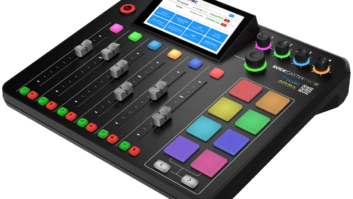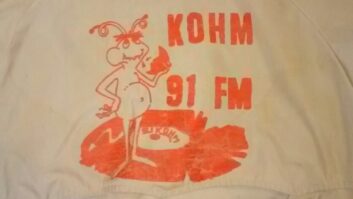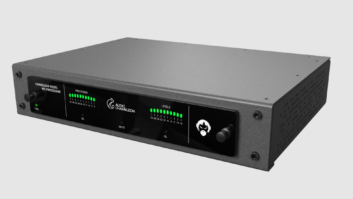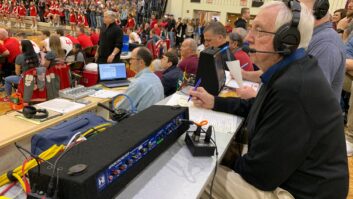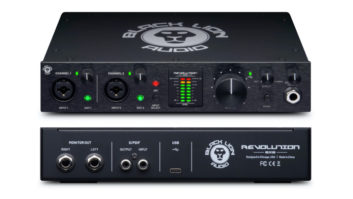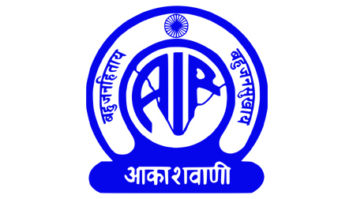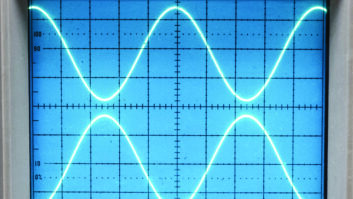Today’s High-Performance Audio
Aug 1, 2001 12:00 PM, By Toni Flosi
With a ten-year history of bringing some of the best and brightest in classical music to the radio, National Public Radio’s Performance Today boasts a listenership just under two million and a carriage list of over 250 stations. It is the most listened-to classical show on public radio and broadcasts two hours per day, seven days a week. Two to three live performances air in a typical month, with a scope ranging from solo piano to chamber orchestra.

In an ongoing effort to raise its level of quality, Performance Today borrowed two of Neumann’s new M150 Tube microphones during a week of intensive live on-air performances. Engineers ran the M150 Tubes against NPR’s collection of vintage and new microphones on piano, strings, guitar, and an eccentric quartet.
Three to four �Artist in Residency� features per year bring in a selected artist for two weeks. During the second week, the artist performs live either solo or with accompaniment for one hour every day. Station personnel capitalize on the unusually high number of live performances during the second week to try new equipment and new techniques. The acquisition of the new microphone coincided with just such a week.
The Neumann M150 Tube inherits much of its design from the Neumann M50, a microphone that has earned the respect of classical recording engineers for its exceptional rendering of strings and orchestras. Both microphones feature a unique polar pattern. At low frequencies, the mics have an omnidirectional pattern. The directionality increases with higher frequencies. Both microphones possess a sound that engineers describe as clear and free of mud, smear, and haze. The M150 Tube departs from the older M50 with the incorporation of a titanium capsule, a sophisticated power supply, lower self-noise and a transformerless tube amplifier. The titanium capsule owes its existence to recent advances in materials procurement and machining.
Regular use of the Neumann website pinboard alerted one NPR engineer to the release of the new microphone. Familiar with the reputation of the M50, acquisitions producer Steve Zakar worked out an arrangement with Neumann to borrow the M150 microphones for Performance Today.
The pure sound
To put the trial into context, one must realize that the Performance Today staff is forever fighting the acoustical space within which they work. As home to other NPR programs, including NPR news, studio 4A was constructed and treated for multi-purpose use. The 1,800-square-foot, two-story studio has hosted everything from election night coverage to town hall meetings to orchestras. Balancing all of these uses requires compromises, chief among them ambiance. The space is, in a word, very dead.
Musicians seldom love the space, but they do get enough of a bounce to hear themselves and one another. The Performance Today production staff gives musicians enough time to acclimate and to balance themselves. Unlike jazz sessions broadcast from the studio, engineers treat classical sessions with generous amounts of artificial reverb from a Lexicon 480 or a TC Electronic 6000.
The microphone placement used with a string quartet.

The artist in residence during the trial was pianist Jeremy Denk. During the week, he performed solo on Monday and Wednesday. A violinist accompanied him on Tuesday, and a string quartet joined him on Thursday and Friday. Additionally, Performance Today taped a session with legendary classical guitarist Pepe Romero on Friday. The following Monday saw Quartetto Gelato in the studio for another opportunity to try out the M150 Tubes.
Every microphone used in the comparisons went through Millennia Media preamplifiers for the utmost in signal quality. A Studer 950-S digital board using stock converters performed any necessary mixing and sent the resultant audio out for satellite uplink. Additionally, Performance Today archived the sessions to 16-bit DAT at both 48kHz and 44.1kHz. Artists received a courtesy CD.
The Neumann M150 Tubes ran against a well-respected assemblage of contemporary and vintage microphones including Sennheiser MKH20, Neumann KM63, and Neumann KM86. The KM86s were turbo charged by microphone modifier Klaus Heyne. Each of the microphones had a unique sound with a high degree of definition, clarity, and space. One could imagine specific contexts in which any one of them would have served the situation best. Engineers left all of the microphones up during the week and made comparisons with every new instrument, player, and style. They made the latter comparisons on the theory that repertoire makes a difference and that different styles often call for different sounds.
The house piano is a Steinway B. Small elevators and windows dashed aspirations to employ a full-sized Concert D years ago, and Performance Today has been attempting to make the B sound like a Concert D ever since. Nevertheless, the instrument is in excellent condition and has been played by such luminaries as Jean-Yves Thibaudet and Leif Ove Andsnes.
Location, location, location
The Performance Today engineers positioned the M150 Tubes one foot apart and seven feet back from the piano. To insure high-fidelity mono-compatibility, they aimed the microphones straight ahead. They report that the microphones conveyed a spectacular sense of space and were amazingly transparent. They credit that transparency with improving the sound with the Lexicon 480 reverberation. Overall, the piano sounded rich, large, and sonically full-bodied.
Zakar noted that studio 4A is notoriously unflattering for violins. In Performance Today’s estimation, the lack of reverberation hits the violin the hardest, as so much of what we expect from a violin is attributable to room sound. Ambiance contributes particularly to the mellowing of highs and the deepening of lows. Without it, the violin sounds flat and screechy.
In the case of violins, the M150 Tube merely captured the problematic screechiness in intricate detail. Consequently, for both the violin accompaniment on Tuesday and for the string quartet on Thursday and Friday, Performance Today used the mellower Sennheiser MKH20s for broadcast because of their subdued high end, slightly exaggerated low end and overall fidelity.
The guitar recording session on Friday allowed the staff to break from their Neumann M269c habit. Popular for use on vocals, the cardioid M269c is well liked with guitars. However, the engineers were eager to try an omni with Pepe Romero and quickly decided that the Neumann M150 Tube outperformed the M269c in the given context.
Compared to other mics in its class, the M150 Tube produced better results at a more distant placement. After much experimentation, the M150 Tubes ended up six feet away from the guitar. Again, in the interest of mono-compatibility, the microphones sat parallel to each other, one foot apart. The clarity and detail they conveyed revealed all the colors of Romero’s fine instrument and captured his fingering and nuance dynamics. Additionally, the considerable distance between the microphones and the guitar mitigated the irritating finger squeak that is so often accentuated by close micing techniques.
As evidenced by its name, the Quartetto Gelato (Ice Cream Quartet) has a unique take on classical music. The four musicians frequently switch between such instruments as guitar, accordion, oboe, English horn, cello and voice in addition to the traditional quartet strings. The group has gained widespread popularity adapting popular music (such as traditional Italian love songs) to fit their more classical instrumentation and attitude.
Consequently, Performance Today was free to experiment with non-standard classical sounds and opted for a drier studio sound in lieu of the usual concert hall target. Engineers erected a stereo pair as before and allowed the seasoned musicians to balance themselves. The result was an attractive studio sound that was uncompromised by supplemental microphones.
NPR’s Performance Today covers a broad spectrum of styles and instruments, and a diverse microphone arsenal allows the show to capture the best performances possible.
Toni Flosi is president of AAdvert International, Glenview, IL, a PR agency specializing in professional audio.





